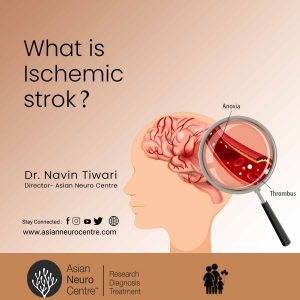- Have any questions?
- 911 12345 29
- info@asianneurocentre.com
What is Ischemic stroke?, Causes, Symptoms, Diagnosing, Treatment & More
What is Cerebrovascular Accident (CVA) Disease, Symptoms, Causes, Treatment
July 26, 2023Ischemic Stroke Treatment – Asian Neuro Centre
August 3, 2023Ischemic stroke is a medical condition that affects millions of people worldwide. In this article, we will demystify the complexities of ischemic stroke and present the information in a simple and easy-to-understand manner.
Let’s explore what ischemic stroke is, its causes, symptoms, and available treatments. Make sure to go through the full article so that you don’t get caught in this serious medical condition.

What is Ischemic Stroke?
Ischemic stroke is a serious medical condition that occurs when there is a sudden lack of blood flow to the brain. This happens due to a blockage or narrowing of the blood vessels that supply oxygen and nutrients to the brain cells. As a result, brain cells start to die, leading to various neurological problems.
Causes of Ischemic Stroke:
Ischemic strokes can be caused by several factors, including:
- Atherosclerosis: When fatty deposits (plaque) build up inside the blood vessels, reducing blood flow.
- Blood Clots: Blood clots can form in the heart or other parts of the body and travel to the brain, causing a blockage.
- Narrowing of Arteries: Conditions like carotid artery stenosis can restrict blood flow to the brain.
- Heart Conditions: Irregular heart rhythms or atrial fibrillation can increase the risk of blood clots that may cause a stroke.
Ischemic Stroke Symptoms:
Identifying the symptoms of ischemic stroke is crucial for seeking prompt medical attention. The common signs include:
- Sudden weakness or numbness in the face, arm, or leg, especially on one side of the body.
- Difficulty speaking or slurred speech.
- Trouble walking, dizziness, or loss of balance.
- Sudden, severe headache with no apparent cause.
- Blurred vision or sudden loss of vision in one or both eyes.
Diagnosing Ischemic Stroke:
To confirm an ischemic stroke, doctors may perform several tests, including CT scans, MRI scans, and blood tests. These tests help determine the location and extent of the blockage, guiding the treatment plan.
Ischemic Stroke Treatment:
Treatment for ischemic stroke aims to restore blood flow to the brain and prevent further damage. Some common approaches include:
- Thrombolytic Therapy: Administering medication to dissolve blood clots and restore blood flow.
- Mechanical Thrombectomy: Using a catheter-based procedure to physically remove the clot.
- Antiplatelet and Anticoagulant Medications: These help prevent blood clots from forming or getting bigger.
- Rehabilitation: Physical and occupational therapy to aid in the recovery process.
Dr. Navin Tiwari
Consulting Neurologist
